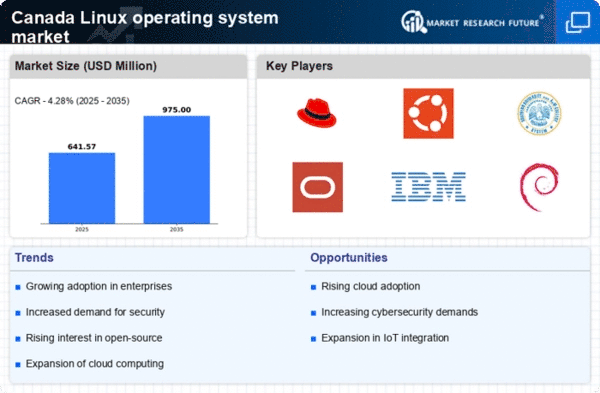Community-Driven Development
The linux operating-system market in Canada benefits from a robust community-driven development model. This collaborative approach fosters innovation and rapid problem-solving, as developers from diverse backgrounds contribute to the improvement of linux distributions. The active participation of Canadian developers in open-source projects enhances the quality and security of linux systems. Furthermore, this community engagement often leads to faster updates and a more responsive development cycle. As organizations increasingly recognize the advantages of community support, the linux operating-system market is likely to expand, attracting more users who value the collaborative nature of open-source software.
Growing Demand for Customization
The linux operating-system market in Canada experiences a notable increase in demand for customization options. Organizations are increasingly seeking tailored solutions that align with their specific operational needs. This trend is particularly evident in sectors such as finance and healthcare, where unique software requirements necessitate flexible operating systems. According to recent data, approximately 35% of Canadian businesses report a preference for open-source solutions due to their adaptability. This customization capability not only enhances operational efficiency but also fosters innovation, as companies can modify the software to suit their evolving requirements. As a result, the Linux operating system market is likely to experience sustained growth driven by the demand for customized solutions.
Increased Focus on Sustainability
the Linux operating system market in Canada is witnessing an increasing focus on sustainability and environmental responsibility. Organizations are increasingly aware of their ecological footprint and are seeking solutions that align with their sustainability goals. Linux systems, known for their efficiency and lower resource consumption, are becoming a preferred choice for environmentally conscious businesses. Recent surveys indicate that around 40% of Canadian companies prioritize sustainable IT practices, which include adopting linux operating systems. This trend not only reflects a commitment to environmental stewardship but also positions the linux operating-system market as a leader in promoting sustainable technology solutions.
Support for Emerging Technologies
The linux operating-system market in Canada is poised for growth due to its strong support for emerging technologies. As industries increasingly adopt cloud computing, artificial intelligence, and the Internet of Things (IoT), the flexibility and scalability of linux systems become paramount. Many Canadian tech companies are leveraging linux to develop innovative applications that integrate seamlessly with these technologies. This trend is reflected in the rising number of startups and established firms that choose linux as their preferred platform for development. The ability of linux to adapt to new technological advancements positions it as a vital player in the evolving landscape of the Canadian tech industry.
Cost Efficiency and Budget Constraints
In the current economic climate, the linux operating-system market in Canada is significantly influenced by cost efficiency and budget constraints. Many organizations are facing financial pressures, prompting them to seek more affordable alternatives to proprietary software. Linux-based systems often present a lower total cost of ownership, as they typically do not require expensive licensing fees. Recent statistics indicate that businesses can save up to 50% on software costs by transitioning to linux operating systems. This financial incentive is compelling for small to medium-sized enterprises, which are increasingly adopting linux solutions to optimize their budgets while maintaining robust operational capabilities.
















